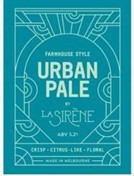Trade marks – appeal from judgment dismissing trade mark infringement claim – inherently adapted to distinguish – deceptive similarity
This was an appeal from the decision of the primary judge in Urban Alley Brewery Pty Ltd v La Sirène Pty Ltd [2020] FCA 82. The appellant, Urban Alley, had sued the respondent, La Sirène, for infringement of its trade mark registration in class 32 for beer, comprising the words “urban ale” (“Word Mark”). The alleged infringement was in relation to La Sirène’s use of the words “Urban Pale” on the label of its beer products (below), as well as on its website and in social media.

Relevantly, before the primary judge, the Word Mark was cancelled under s 88(1)(a) of the Trade Marks Act 1995 (Cth), based on ss 41(1) and 44(1) of the Trade Marks Act. That is, the primary judge found that the Word Mark was not capable of distinguishing Urban Alley’s goods from those of other persons, and that the Word Mark was deceptively similar to an earlier registration comprising the words “Urban Brewing Company”, owned by an unrelated company. Based on these findings, Urban Alley’s infringement claim could not be supported. In any event, the Primary Judge found that the infringement claim could not be made out as La Sirène was not using the words “Urban Pale” as a trade mark on or in relation to its beer product.
On the question of distinctiveness, the Full Court did not accept that the primary judge erred in finding that the Word Mark was not capable of distinguishing Urban Alley’s beer within the meaning of s 41(1) of the Trade Marks Act. The Full Court accepted that the primary judge’s findings as to the descriptive and laudatory meaning of the word “urban” in relation to beer was open to him. The Full Court noted (at [71]):
The corollary of the primary judge’s findings is that the meaning of “urban ale”, when used in relation to beer, is not allusive or metaphorical (as the appellant contended them to be). His honour so found at [141]. As his Honour put it, the evidence established that the word “urban”, in its relevant context, has a tangible meaning – beer produced in an inner-city craft brewery.
A live question in the case was whether a “characteristic” of beer could extend to the location in which it was brewed. The Full Court agreed with the primary judge that it does. A “characteristic” of beer was not confined to its style or flavour, but rather, could encompass other attributes, including the fact that the beer is a craft beer brewed in an inner-city location. The Full Court agreed with the primary judge that other traders would seek to use, without improper motive, the word “urban” to describe this characteristic in relation to their own goods (beer) having this characteristic.
Another ground of appeal concerned the Primary Judge’s finding that the Word Mark was deceptively similar to the Urban Brewing Company Trade Mark within the meaning of s 44(1) of the Trade Marks Act. Urban Alley submitted that as the primary judge found that the words “brewing company” and “ale” conveyed different things (when assessing substantial identity), the two marks could not be deceptively similar.
The Full Court rejected Urban Alley’s contentions, noting the substantial differences between the test as to whether marks are substantially identical (side-by-side) and that of whether marks are deceptively similar (imperfect recollection). The Full Court stated that once the differences between the tests are recognised, it can be seen that even though the words “brewing company” and “ale” might convey different things when the marks are compared side-by-side to determine whether they are substantially identical, that conclusion loses much of its significance when the comparison is not a studied comparison but one based on recollection alone. Critical to the primary judge’s conclusion was that, for the purpose of deceptive similarity, the words “brewing company” and “ale” have a close association. Further, each mark shares as its first element the word “Urban”. The Full Court also stressed that it was impermissible to dissect each mark to emphasise its disparate elements and then compare the disparate elements of each to reach a conclusion on deceptive resemblance. That would leave out entirely the impact of the common element “urban”.
Finally, the Full Court determined that it did not need to re-visit the primary judge’s findings on infringement given its conclusions on revocation. The primary judge found that La Sirène was not using Urban Pale as a trade mark. Of note is the comment by the Full Court (at [119]) in obiter dictum namely: “…it is entirely possible—indeed likely—that, absent the finding of the Word Mark’s lack of inherent adaptation to distinguish because of the ordinary signification of the word “urban”, the primary judge would have come to a different conclusion on trade mark use in relation to the respondent’s use of the name “Urban Pale” on the depicted label. This is particularly so when regard is had to the prominence and location of the name “Urban Pale”. Such use would normally be regarded as persuasively suggesting trade mark use, a consideration which his Honour seems to have recognised...”

